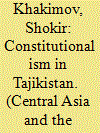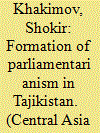| Srl | Item |
| 1 |
ID:
127618


|
|
|
|
|
| Publication |
2013.
|
| Summary/Abstract |
This article examines how constitutionalism is taking shape in present-day Tajikistan and analyzes its main development stages in 1994 (the drawing up and adoption of the first RT Constitution), 1999 (the constitutional reform), and 2003 (the introduction of amendments and additions to the current RT Constitution).
This study defines the general features of constitutionalism of the transition period, which include the following:
1. The broad reception of foreign law, as well as implementation of the international legal provisions of human rights, the democratic foundations of statehood, the separation of powers, and the rule of law while retaining the regulations passed down from Soviet times.
2. The general contradictoriness and inconsistency of the constitutional rulemaking.
3. The transformation of certain provisions of the Constitution into a declaration of intentions, relating to their lack of correspondence to the real political and socioeconomic situation in the country.
It reveals the lack of correspondence between the content of the Constitution and the old legislation largely inherited from the Soviet past and presents the content of the constitutional reform carried out in 1999 within the framework of executing "The General Agreement on Establishing Peace and National Consent in Tajikistan."
The author analyzes the amendments and additions to the Constitution, the adoption of which was brought up at the 1999 referendum.
The article presents an appraisal of the constitutional reform of 2003 and examines the problems of carrying it out, during which favorable conditions were created for the emergence of authoritarianism in the country.
It also notes that Tajikistan's sociopolitical reality creates prerequisites for differences between the de jure and de facto constitution. This usually leads in practice to a certain shift from democracy to authoritarian methods of executing state power.
|
|
|
|
|
|
|
|
|
|
|
|
|
|
|
|
| 2 |
ID:
139287


|
|
|
|
|
| Summary/Abstract |
This article examines the comparative legal, theoretical, and historical aspects of parliamentarianism. The author analyzes the formation of Tajik parliamentarianism and describes its primary characteristics. He also gives the reasons for the formation of parliamentarianism in Tajikistan and the obstacles hindering it.
|
|
|
|
|
|
|
|
|
|
|
|
|
|
|
|